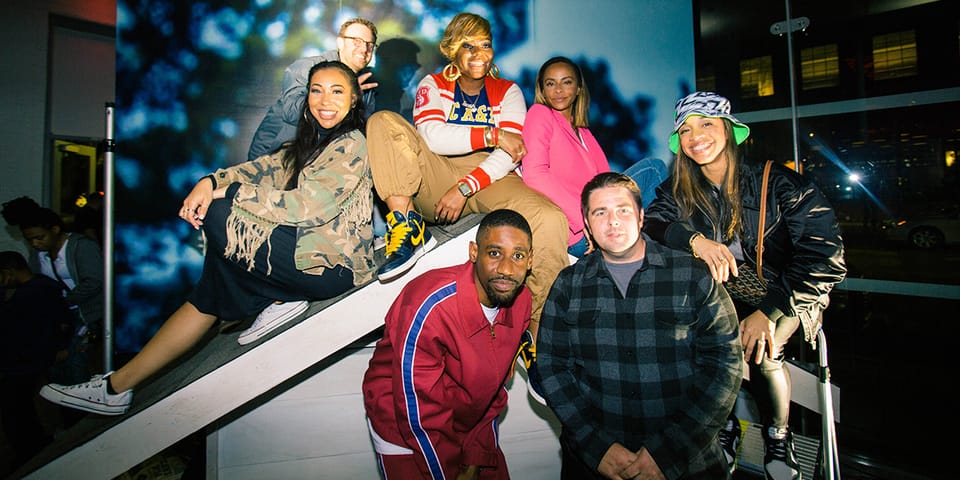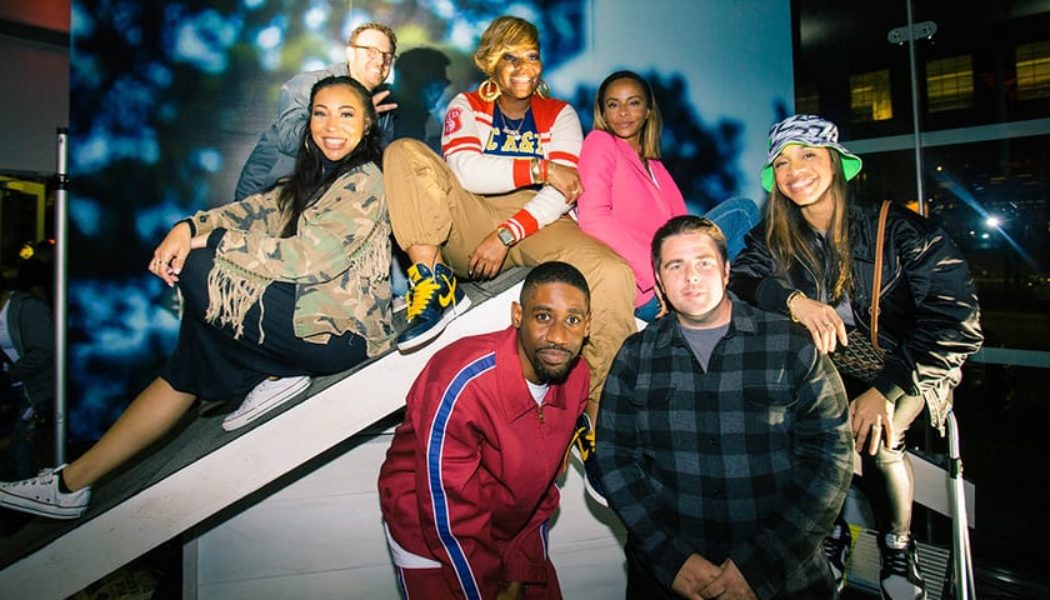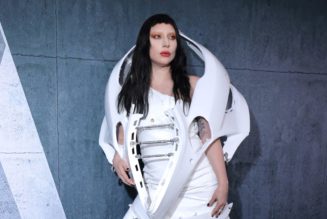
Growing up in an immigrant, multicultural home meant that Rochelle Balogun and her sister were introduced to a diverse array of music. Balogun grew to love music so much, in fact, that she spent her free time digging for underground tracks and building one of the most enviable Napster accounts of the noughties — foreshadowing her future career as one of Amazon Music’s Senior Music Curators.
Now, almost five years into her role, Balogun curates R&B, Afrobeat as well as hip-hop. She works with several teams, both internal and external, to provide Amazon Music subscribers with intricately-constructed playlists that aim to provide an educational listening experience. With so many moving parts involved, she’s been intentional about fine-tuning her organization, communication and time management skills. Managing relationships with fellow curators, artists and their teams plus managers and label representatives has also proven to be crucial, and makes for easier execution of her role.
The most fulfilling part of her career, however, is advocating for emerging artists. Although Amazon Music utilizes data for its releases, that doesn’t stop Balogun and her team from trusting their instincts and supporting an artist or genre. Take their global Afrobeats programming, for example. Very little commercial data was available to forecast just how big the genre would get, but massive cultural moments indicated that Afrobeats was moving towards an explosion in popularity. “Culture is not an easy metric to quantify, and I believe that’s when experience and gut come into play,” Balogun says. Some of their biggest successes include Tems, who was one of Amazon Music’s 2019 Artists To Watch and is now an Academy Award nominee, and Rema, who’s had a song take the #1 spot on the US’ pop and rhythmic radio charts and was supported by Amazon Music during one of her first LA shows.
“So many people have perceptions about the music industry – some good, some bad – and I hope that through my work and accomplishments, I am able to dispel some of those and show that hard work, humility and getting things done is what really matters in this industry,” she says.
In three words, how would you describe your job to someone who isn’t familiar with the music industry?
Obsessed music fan.
“Music curators also tend to be early on music, artists and trends, and advocate for and champion emerging talent.”
Can you run us through a day in your work life?
There’s no one day that looks the same, with the exception of maybe Thursday, which is “store turn” — the evening where new music is released and playlists and stations are refreshed. On Thursdays, I spend most of my time adding songs to playlists and stations.
A lot of my day consists of taking meetings, both internal and external. I have internal meetings with different teams to ideate or plan things we’re working on, and my external meetings are usually with artists and their teams to listen to music and brainstorm ways we can work together. A huge chunk of my day, depending on how meetings are scheduled, goes into listening to unreleased music ahead of the weekly Thursday store turn, and deciding which playlists these songs would go on, working with other curators to find more programming placements for songs and identifying different ways to amplify these artists’ music on our service.
What are some characteristics you and your team look for in an emerging artist?
I’d say my curation team — and the team that makes up Rotation as a whole — are music-obsessed fans who work in music. The first thing we consider is whether the music is good. Amazon Music is unique because we have so many different verticals to help amplify and showcase an artist’s music, but the primary consideration is the music that emerges from your headphones and speakers. We get the unique privilege to listen to a lot of music, and we work to cut through the noise, make great music rise to the top and grab people’s attention. I’d also say we look at how much drive and ambition an artist puts into their own music and career; hard work and perseverance shines through and our teams definitely take notice of that.
Can you guide us through the process of curating Amazon’s Rap/R&B Rotation?
There are several factors and inputs that go into curating these playlists each week. I work with major labels and indie distributors to capture all of the new music that is released weekly and ensure those songs receive programming placements on our many playlists and stations. But my north star with curating Rap Rotation and R&B Rotation is finding the best music and biggest hits for our customers. That also means making sure we’re being inclusive of emerging and female talent, and songs that are trending online — even though the data may not quite yet reflect that growth on our service.
I don’t solely rely on music that is sent by labels; I also spend a lot of time online, looking at content, watching TV and movies, and seeing and talking with the Rotation team, as well as different peers and colleagues about music they’re seeing and are excited about.
“As a woman working in hip-hop, the biggest challenge I’ve had to overcome — and something I’m mindful of and work on diligently — is trusting myself and not letting the stigma of being a woman in hip hop get in my head or cloud my instincts or intuition.”
You developed the programming for Amazon Music’s “50 & Forever.” Can you briefly run us through the work you did for that and how long the entire project took?
For “50 & Forever,” our campaign for hip-hop’s 50th anniversary, I worked with my smaller curation pod (comprised of two young Black women, Stephanie Harris and Bria McDaniel – shout out to them!), and we made it our strategy north star to highlight each corner and facet of the hip-hop genre over the last 50 years — not just on our playlists but also with the artists we’re visually representing on the service.
We launched our campaign with a celebration of De La Soul’s catalog coming to streaming and a subsequent celebration of life for Trugoy the Dove, highlighting an eclectic-yet-important group of pioneers in hip-hop. It was important to us to showcase the varied colors and textures of hip-hop, the many artists and contributors across the genre, how women have been influential and played a role in the genre from its genesis and the way female rappers have evolved their method of storytelling over the years.
We also looked at all of the regions of the country and the eras since the ’70s, and sought to honor those contributions while also providing our listeners with an educational listening experience.
Based on your own observations and career experience, how would you say the culture of hip-hop and R&B have changed over the years?
Hip-hop is a continually shifting genre that always remains rooted in authenticity. Growing up primarily listening to hip-hop, I was always fascinated by the female rappers. I distinctly remember listening to Queen Latifah’s “U.N.I.T.Y.” and understanding how “b*tch” was used contextually in that song. Over the years, I’ve remained fascinated with female rappers, the stories they tell and the punchlines they use, and female rappers continue to kill it today, each bringing their own style to hip hop – from Latto, to BIA and Little Simz.
What are the necessary first steps someone should take to enter a career as a music curator?
I wouldn’t say there’s one necessary step, as it depends on the role someone is interested in pursuing. I think having strong relationships is an important element overall, though. Music curators also tend to be early on music, artists and trends, and advocate for and champion emerging talent. It also doesn’t hurt to have good taste, though “good” is subjective.
What was the biggest challenge you’ve had to face so far, and how did you overcome it?
As a woman working in hip-hop, the biggest challenge I’ve had to overcome — and something I’m mindful of and work on diligently — is trusting myself and not letting the stigma of being a woman in hip hop get in my head or cloud my instincts or intuition. So many times, I’ve walked into the room and people have assumed that some of my male counterparts are the Hip-Hop/R&B curator. I overcome moments like that by remaining objective and staying focused on my task at hand.
“Don’t oversell what you can do, don’t overpromise what you can’t get done and don’t be disingenuous about who or what you know or where you’ve been.”
What lessons or work ethics did you only pick up after working in the music industry?
As cliché as this sounds, I always try to keep it real. If you tell the truth, you don’t have to remember anything. Don’t oversell what you can do, don’t overpromise what you can’t get done and don’t be disingenuous about who or what you know or where you’ve been. I think that has taken me quite far and allowed me to earn trust with both my teammates at Amazon Music and people outside the company.
What is one thing about your job that most people would find unexpected or surprising?
Probably that I don’t listen to music all day long. I’ve heard people make the assumption that all I do is listen to music when in fact, I have to schedule blocks of time to make sure I get through all of the new music coming out that week.
Is there a secret to career longevity in this industry?
The people I admire who have career longevity in this industry have a few things in common. In addition to being talented in their respective fields, they exhibit a spirit of humility and honesty and a desire to do the right thing within their roles. From the outside looking in, there appears to be a lot of glitz and glam in the industry, and it’s easy to get caught up in the “clout” of it all, but they understand that the job and their purpose is bigger than them. They understand that we have a collective responsibility to our culture and the genres we represent, especially in corporate settings where stereotypes about our music, culture and artists abound.
What are some habits you follow regularly to always maintain a good headspace for work?
Maintaining balance is very important. When I find myself overwhelmed with whatever might be going on at work, I make sure to ground myself and take it back to basics by spending time with my family. I am a native Angeleno, and I’m blessed to live in the same city as my family, so I make it a point to not go too many days without seeing my two young nieces, who bring me so much happiness. My husband also works in music, so we both have to be intentional about unplugging from the music industry world and make time for our other interests. Family definitely grounds me and puts me in a great headspace. A great and hearty nap also helps!
What does a day off look like for you?
It depends on what has happened during the week — but I try to instill organization in my personal life, so running errands, heading to our local farmers market or trying new restaurants are some of the ways I spend my time during a day off. LA has great culinary experiences, so I always try to find new places to eat at.
How do you see your job evolving with the music industry in the next five years?
I think we’ll continue to see global genres emerge to a more commercial forefront the way we have seen with Latin, Afro and K-Pop. Social media sites like TikTok will help drive new songs and trends as well.
If not music, what would you be doing?
I was definitely law school-bound, and would probably be an attorney if I were not living out my wildest dream as a music curator!
Stay tuned for more features with music industry professionals — from managers to sound engineers, stagehands and others; the people who make the music world go round without standing behind a microphone.








